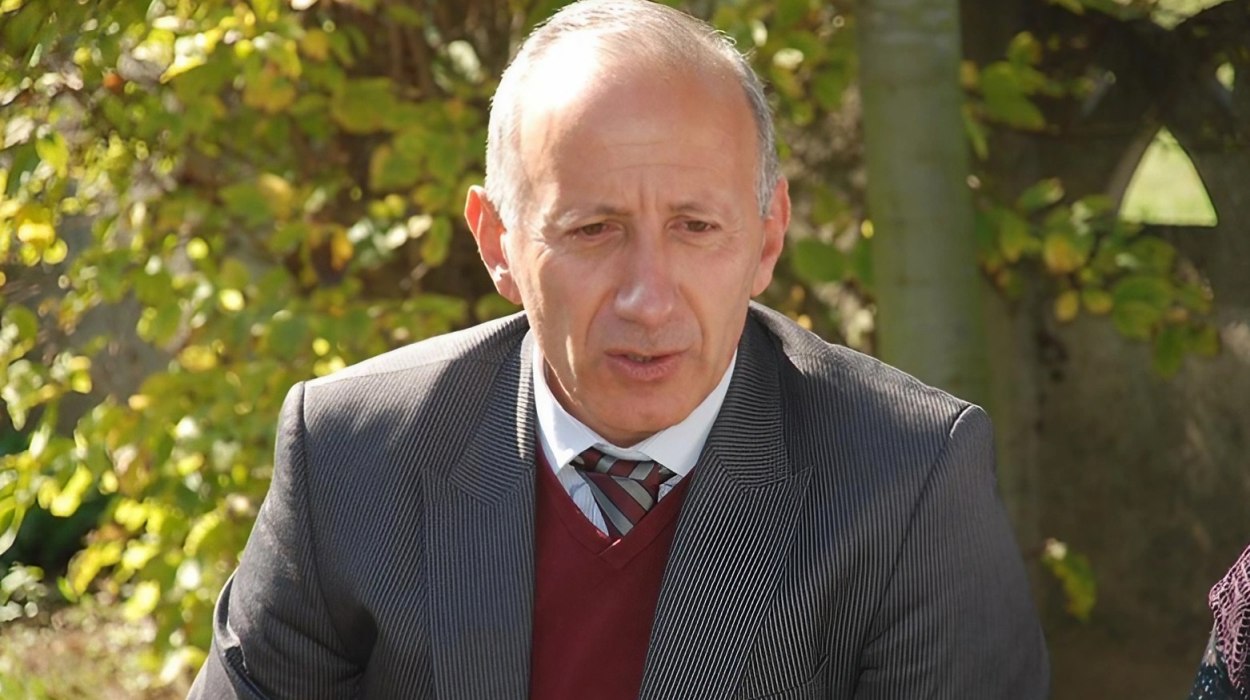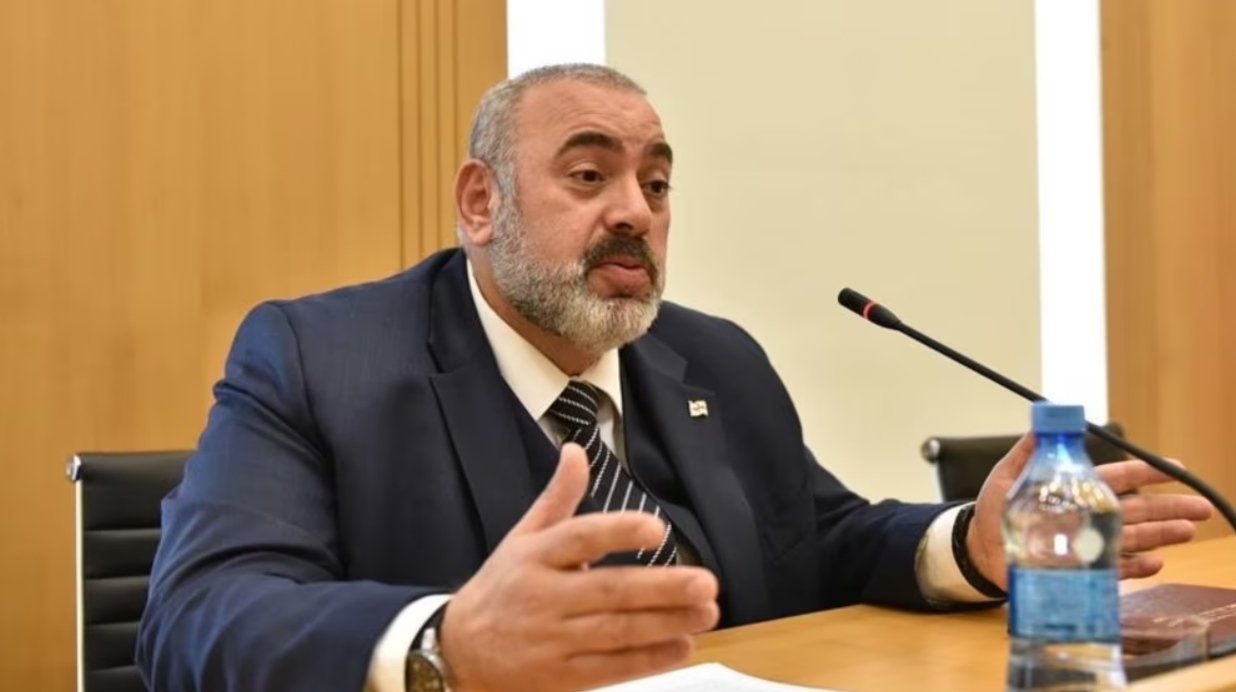Ruslan Khashig: "The Statements of Koba Kobaladze are Absolute Lies"

Ruslan Khashig, chairman of the Union of Journalists of Abkhazia, director of the TV channel 'Abaza-TV'.
Ekho Kavkaza | by Vitaly Sharia ― 25 March 1993, may not be a memorable date for Abkhazia, but it is still remembered by survivors of the Georgian-Abkhazian war. On that day, a large popular meeting was held in the overcrowded hall of the House of Culture of the Gudauta region to decide whether to continue the resistance after the March military failure.
"Ekho Kavkaza" annually reports on the most important dates in the modern history of Abkhazia. Among them is the failed offensive of the Abkhazian army on Sukhum on March 15-16, 1993, which resulted in the deaths of 222 fighters. This was a huge figure for such a small ethnic group, with almost all of them being Abkhazians. However, "Ekho Kavkaza" has never devoted a separate story to another date closely related to it - March 25 of the same year, when a people's gathering took place in the crowded hall of the House of Culture of the Gudauta region.
As part of the commemorative events dedicated to the March offensive of the Abkhaz troops on the Gumista front, a presentation of the documentary chronicle "Mothers who Overcame Pain" was held at the Museum of Military Glory named after Vladislav Ardzinba in Sukhum on the Abaza-TV channel.
Ruslan Khashig, the Director of the TV channel and Chairman of the Union of Journalists of Abkhazia, who led the presentation, stated:
"The war has its own rules, but our enemies, having disregarded them, refused to transfer the wounded, as well as the bodies of the dead, to us. There were negotiations, and the Georgian side constantly delayed the transfer. As you know, it has always been important for the Abkhazians to bury the heroes who laid down their lives for the Motherland with all honors, but we were not allowed to do this. The Georgian side pursued the goal of creating division among the people of Abkhazia. It was another war - a psychological one."
It is an inalienable right of every person to bury their loved ones with dignity. This sentiment is especially strong in the traditions of the Caucasus, and the desire to do so is a human characteristic that transcends time. Suffice it to recall the sufferings of the Trojan king Priam, described thousands of years ago in the Iliad by Homer, who made his way into the tent of the Greek hero Achilles at night to beg for the body of his son Hector, who had fallen in battle.
As part of the commemorative events honouring the March offensive of the Abkhazian troops on the Gumista front, "Abaza TV" aired a documentary chronicle titled "Mothers who Overcame Pain." The footage was recorded from March 18th to 25th in 1993, after the Abkhaz troops' unsuccessful offensive operation that resulted in the death of 222 people, with 23 missing.
In the past thirty years, the Abkhazian society has not forgotten the situation surrounding the transfer of the bodies of dead participants in the March offensive. In the documentary book "The Abkhaz Tragedy," published in the autumn of 1993, the author noted that the grief of people who lost loved ones during the bloody battles on the outskirts of Sukhum was worsened by the impossibility of burying them. Many suspected that the Georgian military command delayed the answer to cause discord among the Abkhazians against the leadership of Abkhazia and bring division to the Abkhazian society.
Recently, footage from the Abkhaz television archives was shown, featuring a conversation between the then young Minister of Internal Affairs of Abkhazia (now Prime Minister) Alexander Ankvab and Beslan Kobakhia discussing negotiations with the Georgian side regarding the return of the bodies of the dead, which were still unsuccessful.
On 16 March 2023, Ekho Kavkaza aired two segments dedicated to the events of thirty years ago, one representing the Abkhaz side and the other the Georgian. This has occurred before when referring to significant dates in the history of both peoples, and the difference in approaches and assessments when remembering them is not surprising. However, Abkhaz listeners and readers were shocked by Koba Kobaladze's comments in a recent interview with Ekho Kavkaza. Kobaladze, a participant in the Gumista military operations and a Major General in reserve, claimed that the Georgian side had returned the bodies of the dead to the Abkhazians in the following days.

Koba Kobaladze
Koba Kobaladze stated: "In the following days, of course, we returned the bodies of the dead to them. Reprisals against the dead are not the act of a warrior... You know, regardless of what we say, respect for the enemy is in our genes. Military clashes are one thing, but the humiliation of an already defeated and captured person does not fit our customs, nor is it encouraged by the Lord God."
+ Visiting Hell: How Relatives Identified the Dead in the March Offensive
+ "Mothers who Overcame Pain": Abaza TV's Documentary on the Tragic March Events of 1993
+ On the Other Side of Gumista: The Harsh Lessons of the March Offensive
Ruslan Khashig read these comments on the Ekho of the Caucasus website and wondered why, three decades later, Mr. Kobaladze needed to say such a thing when the whole of Abkhazia knew it to be untrue. He expressed his desire to speak out on the issue, stating that: "The statements of Koba Kobaladze in an interview with Ekho Kavkaza do not correspond to reality. This is an absolute lie. I can state this with full responsibility as a journalist, as a person who knows and remembers the events of those days in March 1993 well. I not only saw and heard it, we have video evidence confirming the exact opposite. In March 1993, the Georgian side did not hand over a single prisoner of war or the bodies of the dead to the Abkhaz side, despite negotiations between the Abkhaz authorities and the authorities of Tbilisi and the Georgian military for over a week. Media reports and interviews are kept in our archive. Every day they promised the Abkhaz side that the bodies of the dead would be handed over tomorrow, but the next day they came up with new problems. This continued from 18 March to 24 March 1993."
On 25 March, a meeting was held for the families of fallen soldiers and the public from various villages and cities. The aim of the meeting, as announced, was to discuss what to do with the situation that had arisen regarding the issuance of the bodies. However, the discussion soon moved beyond the agreed-upon topic and touched on broader aspects of the socio-political and military situation. One of the speakers began their speech with the words, "Let's first of all decide whether we will fight or surrender..." but was interrupted by angry cries of "Surrender yourself!" The speaker struggled to continue their speech but was met with opposition from the audience. This moment was described in the book "Abkhaz Tragedy," which recounted events from the war.
The speaker was not named in the book, but at a recent presentation of the documentary chronicle, the speaker was revealed to be Sergey Shamba, then the Commissioner of the Armed Forces of the Republic and now the Secretary of the Security Council. Shamba explained that he deliberately provoked the audience to be frank with their opinions.
Video footage of the meeting, shown on television, brought back memories of the event for many, including young people who had never seen it before. The meeting resulted in an appeal to the people of Abkhazia to continue their struggle. The appeal was based on the words of Shushana Khetsia, an Abkhaz woman who said, "We were not given the bodies of our loved ones, but we know that they lie in their native land."
Ruslan Khashig pointed out that it was not until November 1993 that those who died in the March operation were reburied. More than a hundred bodies were not returned to their families and were buried near the Republican Hospital. Photos and video footage of the reburial were taken and exhibitions were organized in Sukhum and Gudauta to commemorate the event.

Some of the pictures taken at the time were quite disturbing, with some people depicted wearing gas masks. One particular photo, which was included in the second edition of the book "Abkhaz Tragedy" published in early 1994, showed an elderly woman recoiling and covering her eyes with her hand as she recognised her son at an opened mass grave. Years later, Khashig discovered that the woman was the grandmother of his future wife.
After the war, a group of businessmen planned to build a store on the site of the former burial place, but the mothers of the victims protested and the building was not constructed.
This article was published by Ekho Kavkaza, and is translated from Russian.